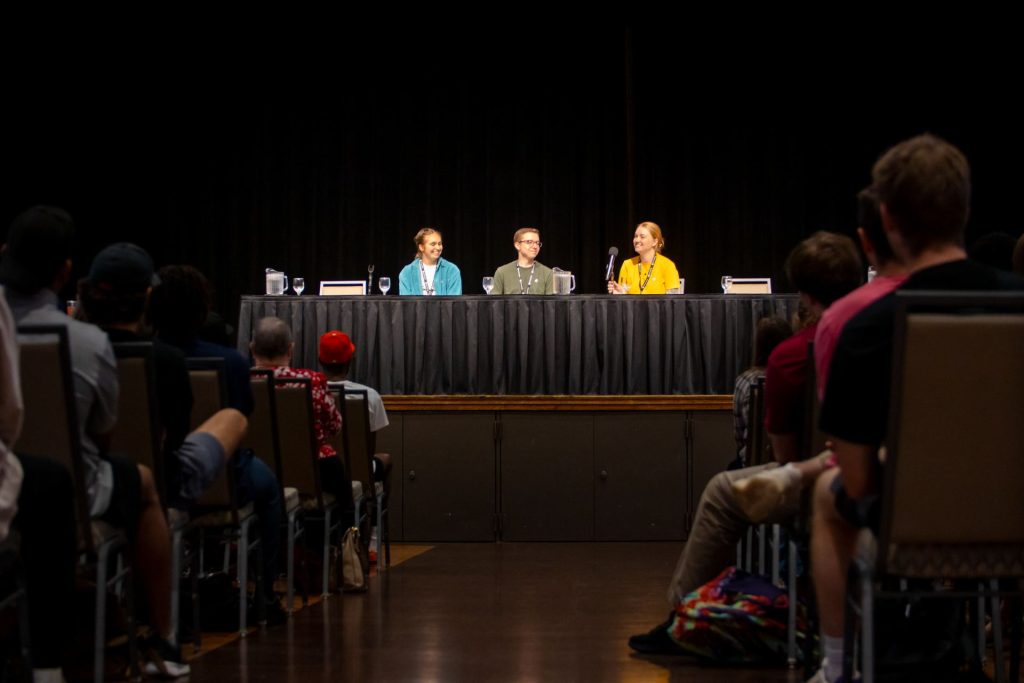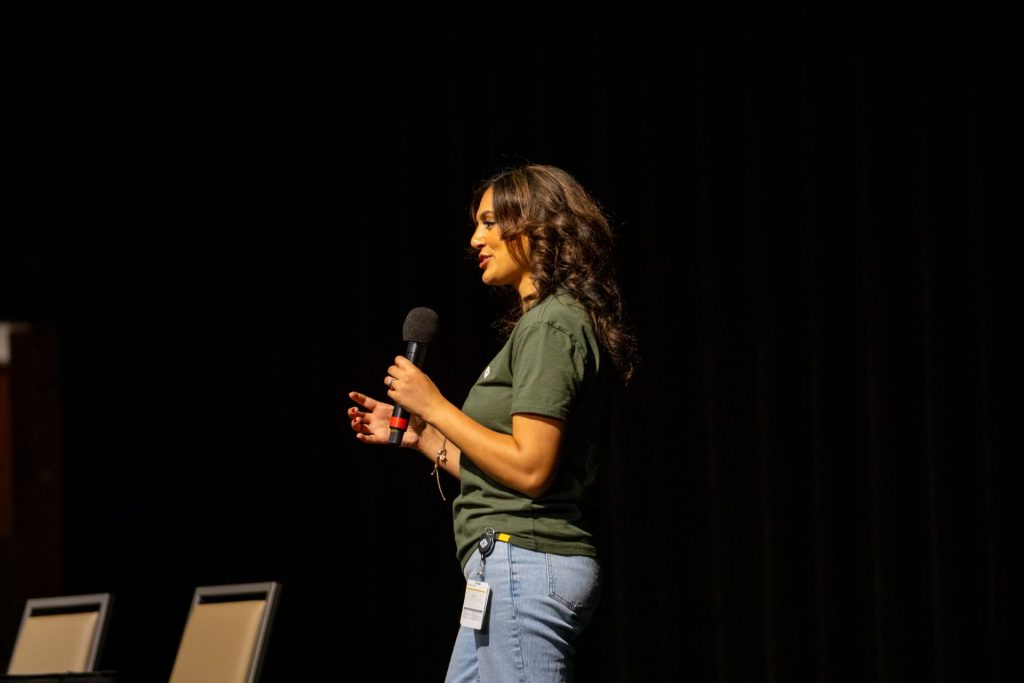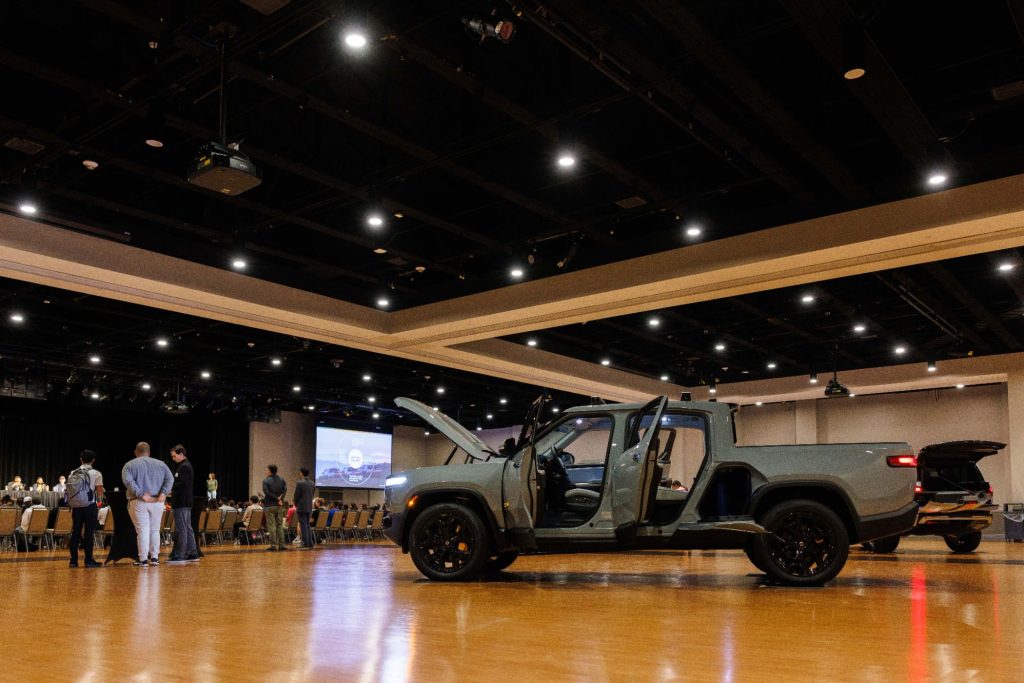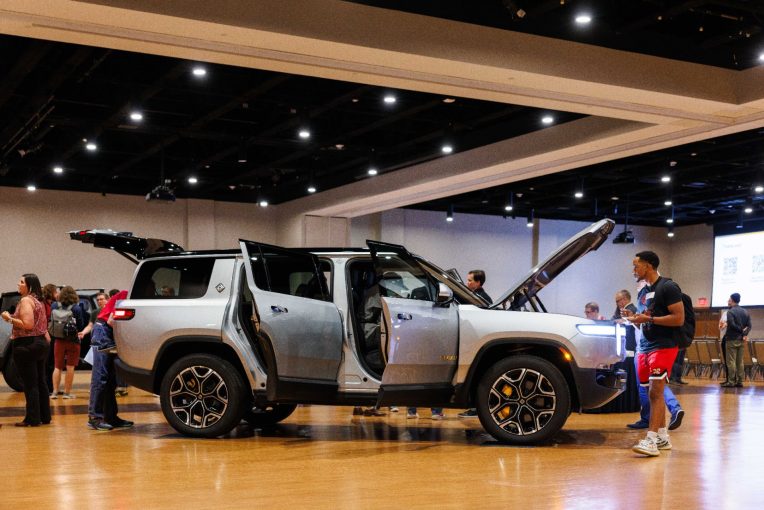It was love at first sight for Joshua Nelson ’23, a self-proclaimed “car nerd,” when he first saw Rivian’s sleek, yet rugged, electric pickup truck.
“Growing up, I was a little skeptical about EVs (electric vehicles),” Nelson said. “But Rivian really got me into them because of the way they’re making these trucks, designed for off-road adventures.”
Founded in 2009, Rivian is an EV manufacturer that makes R1T pickup trucks, R1S sport utility vehicles (SUVs), and the EDV (electric delivery van) for Amazon at a 3.3-million-square-foot plant in Normal. Rivian purchased the former Mitsubishi plant four miles west of Illinois State University’s campus in 2017, and the first R1T was produced there in 2021.
“When a cutting-edge car company sets up shop in your backyard, you take notice,” said Nelson, a Normal native. “I wanted to go to ISU so I could be set up to work at Rivian. And it happened to work out that way, which is awesome.”
Nelson majored in engineering technology at Illinois State and landed a process engineering internship in Rivian’s body shop during his senior year. He was hired as one of Rivian’s more than 7,000 full-time employees in Normal following graduation last spring.

“In the process engineering department, we develop processes for manufacturing, like how to attach a body panel. There are so many things involved,” Nelson said. “It’s been a really cool opportunity for me to stretch my skills that I learned here at ISU and apply them to something that’s pretty important to this developing company.”
Nelson was one of three Illinois State alumni who spoke during a Career Exploration with Rivian panel and networking event attended by more than 150 students in the Bone Student Center’s Brown Ballroom October 2.
Moderated by Sabreen Mere, Rivian’s manager for talent acquisition, the panel offered insights into internship and job opportunities with the growing EV manufacturer. Attendees also got to explore an R1T and R1S on display in the ballroom.

“We’re extremely excited to be a local employer, and I believe the Town of Normal has contributed greatly to Rivian’s success,” Mere said. “So, what better way to pay it back to the University than by providing internship opportunities directly to Illinois State students?”
In addition to recruiting students from the Department of Technology, among other academic areas, Mere said she is “very excited” for Illinois State’s College of Engineering. She said Rivian plans to collaborate with the University’s newest college, which is scheduled to welcome its first group of students in the fall of 2025.
“We’re going to be providing insight on EV development and manufacturing and what it’s like to work in these evolving industries,” Mere said. Rivian aims to complement classroom curriculum by providing internship opportunities for students through its Emerging Technology Co-op Program, according to Mere.
“This gives students real-world experience through a seven-month rotational program,” Mere said. “It’s not just manufacturing engineering. We also offer opportunities in controls, automation, and robotics, and we offer students a chance to work in technical program management. Those are just some of the ways that we’re trying to bring talent from our local community to Rivian, and we’re excited to see where that takes us next.”
Illinois State senior engineering technology major Dia Widener joined Nelson on the panel to discuss her current internship as a joining engineer. Her team is responsible for all aspects of manufacturing that involve joining two pieces of metal together.
“We’re talking welds, rivets, adhesive, sealer—all of the things that keep the body of the vehicle together,” Widener said. “It’s a good time getting to apply the things I learn at ISU and be hands on. And then, to drive around town and see all of the Rivians driving around—it’s a really exciting company to work for. It’s a good adventure.”

Dr. Matt Aldeman, an associate professor in the Department of Technology who teaches renewable energy and engineering technology courses, helped organize the Rivian event in partnership with Career Services, the Office of Sustainability, and University Advancement. He said having an “advanced manufacturer” like Rivian a few miles away from campus is a unique asset for the University.
“Rivian has already made a big impact with our students,” Aldeman said. “We have quite a few students from the engineering technology program and from the sustainable and renewable energy program who have gotten to work out there and even advanced within Rivian.”
Aldeman said students who intern at Rivian get to apply skills they learn in technology classes, and they gain on-the-job experience that is valuable for them to share with their classmates and professors.
“Seeing it in the real world and then coming back and studying it just makes it resonate more,” Aldeman said. “It’s also great to have students in the classroom who have had those experiences.
“So, when we talk about motors or we talk about batteries or we talk about the lockout/tag-out (workplace safety) system, I ask the students in the class, ‘What have they taught you about this at Rivian?’ And then we can bring that experience together with theory in the classroom and just make it more meaningful.”
Widener, who graduates in December, said she would love staying at Rivian full-time after earning her bachelor’s degree. And she hopes other Illinois State students and alumni will join her on the journey.
“It’s been cool to see Rivian grow from nothing to what it is right now,” Widener said. “Being a part of the future—it’s going to get big. Give it a couple of years. We’re going to do some big stuff.”

